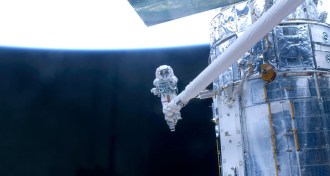Space
Sign up for our newsletter
We summarize the week's scientific breakthroughs every Thursday.
-
 Space
SpaceGalactic black holes may be more massive than thought
The giant black holes at the cores of massive nearby galaxies may be two to four times heftier than estimated.
By Ron Cowen -
 Physics
PhysicsMechanical systems all tangled up
Researchers link the motion of two ion pairs through “spooky action at a distance.”
-
 Space
SpaceAstrometry nabs an exoplanet
long-proposed method of searching for extrasolar planets has finally discovered one — a body six times heavier than Jupiter that orbits a dwarf star 20 light-years from Earth.
By Ron Cowen -
 Earth
EarthPhytoliths as climate clues
Tiny silica plant structures from soil could track temperature changes.
By Sid Perkins -
 Earth
EarthBricks, mortar and magnetism
Medieval French castle, churches yield new data about Earth’s changing magnetic field.
By Sid Perkins -
 Space
SpaceEvidence mounts for liquid interior of a Saturn moon
Plumes of Enceladus offer hints that moon is now or was in the recent past partially liquid inside.
By Ron Cowen -
 Earth
EarthA more organic meteorite
Some meteorites may contain a higher concentration of organic chemicals than previously thought.
By Sid Perkins -
 Astronomy
AstronomyHealing Hubble
A retrospective on the final Hubble Space Telescope repair mission.
By Science News -

-
 Life
LifeLife on Earth took a licking, kept on ticking
Earth's early organisms may not have had to restart after a long spell of asteroid impacts.
By Sid Perkins -
 Space
SpaceLast Hubble rendezvous
During five successful space walks, astronauts repaired and rejuvenated the Hubble Space Telescope.
By Ron Cowen -
 Space
SpaceCosmic dustup settles
Two new studies document how crystalline dust forms in the hot, inner part of a young star’s planet-making disk and then gets incorporated into the cold, comet-forming region billions of kilometers away.
By Ron Cowen